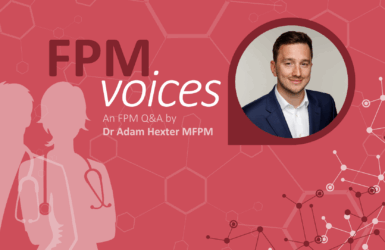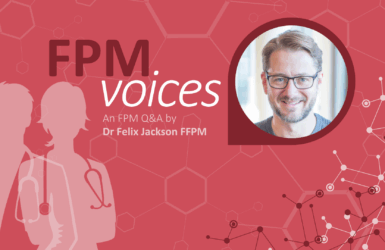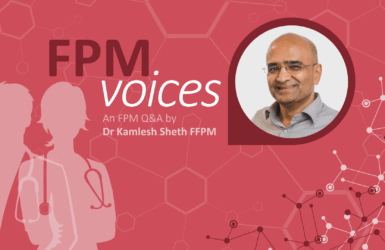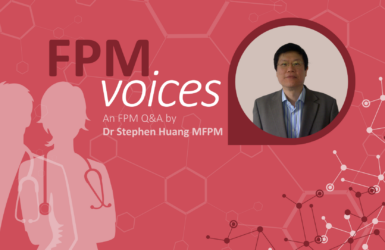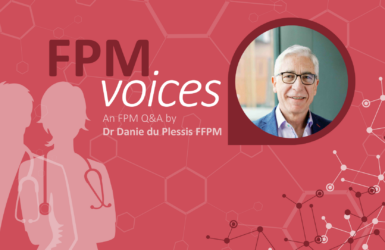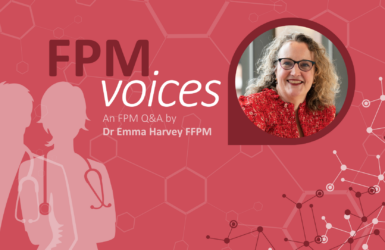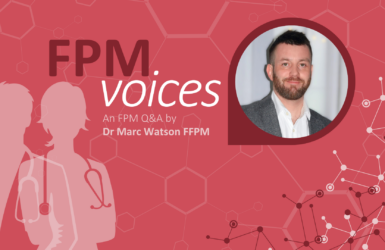Dr Felix Jackson FFPM
An FPM Voices Q&A
Posted on: Thursday 8 May 2025
Author: Dr Felix Jackson
This Q&A has been prepared by Dr Felix Jackson FFPM.
Felix is the Founder and Medical Director at medDigital. He has a particular interest in digital communications and therapeutics, and is currently Chair of FPM’s New Technologies Expert Group. Felix is also a member of the 2025 Annual Symposium Working Group.


FPM Voices is a Q&A interview series that shines a spotlight on the careers and insights of senior and influential pharmaceutical physicians. Through these conversations, we aim to provide colleagues with a deeper understanding of the opportunities, challenges, and rewards of pharmaceutical medicine.
Each interview explores personal career journeys, key lessons learned, and the role that the Faculty of Pharmaceutical Medicine (FPM) has played in shaping professional growth.
What first sparked your interest in pharmaceutical medicine, and what has kept you passionate about the field?
I became a pharmaceutical medic because I saw the opportunities to improve healthcare with digital technologies. The NHS struggles to innovate, but I saw how innovation is part of what makes pharmaceutical companies what they are today, so I joined the industry. And now, over 20 years later, I have enjoyed being part of many truly innovative projects spanning clinical research, insight discovery, communication and the ways we work together.
What does FPM represent to you, both professionally and personally?
I became a Fellow of FPM because I believe that pharmaceutical medicine is the only truly global medical speciality and FPM is raising awareness of our work around the world. Personally, I enjoy spending time with my FPM friends and colleagues who are a wonderfully diverse group of doctors and other professionals, all coming together because we see how our work changes people’s lives for the better.
In what ways have you helped champion FPM’s mission for the next generation of pharmaceutical physicians?
I have enjoyed supporting many different FPM committees and working groups, from when the social media working group first started back in 2004 right up to the Annual Symposium planning for this year! And, I have just been appointed as Chair of the New Technologies Expert Group, a role I am very excited about starting as I will be working with many world experts and learning about incredible new innovations.
What’s a recent innovation or lesson – whether from colleagues, patients, or scientific advancements – that has inspired or changed your perspective?
I had a really interesting conversation recently with a pharmaceutical medic who was trying to use AI to help generate the outline of a clinical research proposal. It quickly became clear to them that AI was not capable of generating anything usable. This illustrated to me that our work as doctors overseeing new technologies is essential to ensure that technologies are not misunderstood or misused.
How has mentorship shaped your career, and how do you support and guide those entering pharmaceutical medicine?
I have had the opportunity to mentor many people over the years, whether pharmaceutical medics, other professionals or people in my personal life (such as when I was a Charity Trustee for the Scouts). Most recently I became a mentor on FPM’s mentoring platform, FPM Connect, to support FPM members. It has been extremely enjoyable spending time with talented people who have left the traditional clinical route to become a health professional focused on a wider public good, rather than individual care. I hope that I have helped them see that being a pharmaceutical physician can be much more than climbing a career ladder – we can also simply do the things we choose, like contributing to communities oversees or supporting a health-focussed charity.
What is one of the biggest misconceptions about pharmaceutical medicine, and how do you think we can change that perception?
I occasionally meet people who think that pharmaceutical companies put profits before patients. But sadly, they sometimes do not believe me when I say that I have never encountered this in my professional life. And furthermore, the pharmaceutical medic role proves to me that companies don’t. Why would they employ so many health professionals to lead, support and oversee activities far beyond those required by law? I believe it is because companies, and the vast majority of the people they employ, know that our work is for everyone who needs, or will need, the treatments we develop. And they know that this is our purpose, not to generate revenue at any cost.
If you were a superhero, what would your superpower be?
Although I would love to be able to breathe under water so I could go swimming deep in the ocean for hours, I think my superpower would probably be far sight. I seem to be able to see things coming a little bit before others. Sadly I’m not always right, but I often see the shape of things in the distance before others have even looked up from the path under their feet.
More from this series


